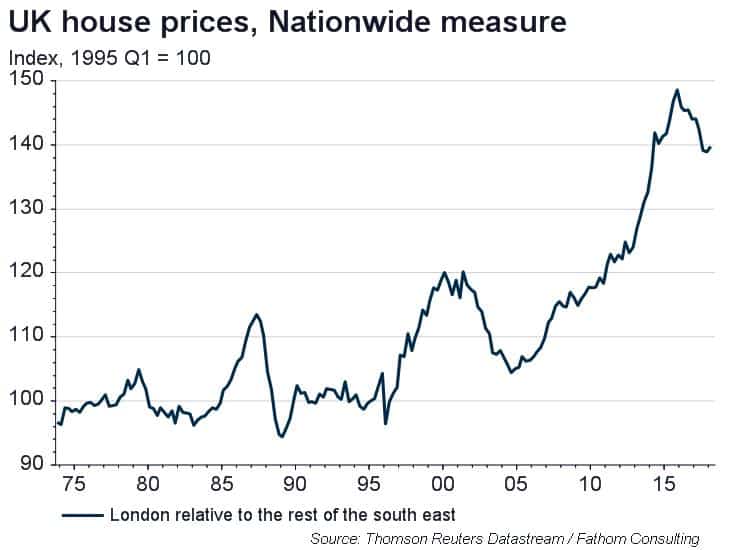A sideways look at economics
There are many things that I’ve long admired about British culture. As a young Italian teenager landing on these shores, I vividly remember being blown away (almost literally) by the music scene, not to mention realising that Benny Hill, a popular British export, might not have been the pinnacle of comedic genius. Political satire and debating were the most eye-opening discoveries of all, as I was mesmerised by programmes like ‘The Day Today’ or ‘The 11 O’clock Show’ and ‘Prime Minister’s Questions’ or ‘Newsnight’.
However, there are certain British traits that still confound me, even now that I’ve become a subject of Her Majesty Queen Elizabeth II. Most of these can be broadly categorised as social interaction norms. Queuing is the obvious one. The only thing that still surprises me about queueing is that no one has yet proposed it as an Olympic discipline. Guaranteed gold medal for Team GB! And the uncanny ability of British people to apologise for everything without any trace of true regret is something that makes my blood boil — the word “sorry” must surely be one of the most devalued words in the English dictionary.
There’s one aspect of British life that fascinates me, because I both greatly admire it, and yet entirely fail to understand it. I refer, of course, to the Stakhanovite British commuter. I’ve conducted a little survey. The median commute among Fathom staff is one of 11 miles, taking 45 minutes, twice a day. But the distribution has large, positive skew, with three people regularly travelling more than 50 miles, taking the best part of two hours to do so, again twice a day. As it happens, my experience is close to the median, but well below the mean, taking a little over 45 minutes to go a little under 11 miles. I find this trifling inconvenience a small price to pay to enjoy the benefits of anonymity that a big, chaotic city like London provides. On the contrary, the mere thought of knowing every single face in a village leaves me gasping for air.
Such is the contrast in my preferences that over the years I’ve actively engaged in numerous conversations to try to unearth what drives the British appetite for such ridiculously long commutes. Some of the more interesting dialogues have revealed a whole social dimension that somehow got lost between an armpit and a tut on an overcrowded tube train. A few will admit outright that they prefer ‘train beer club’ to a swift arrival back home. Others look forward to the annual train Christmas party. Some claim to value a period of uninterrupted time to get their work done. But with some I sense a need for self-reassurance that they have made the right choice. Examples include: “the people are nicer”, “I like the sense of community”, “the schools are better”, and “the air is cleaner”. I could go on. But perhaps the most frequent explanation tends to be: “you get so much more for your money”. But is this really true?
According to the ONS, an average London flat costs just over £400,000. Swapping this for an average semi-detached property elsewhere in the south east would give the ex-Londoner some £77,000 in spare change. Not bad, until one factors in the extra £2,500 in annual commuting costs.[1] Over 25 years, the life of a typical mortgage, this additional expense raises the cost of moving to the countryside by £57,000, eroding almost all of the gains from living in a less expensive property. And that’s before we factor in non-pecuniary costs, such as increased travel time.
To an economist, it’s pleasing that the costs seem to even out in this way, with the capitalised saving of £20,000 over a 25-year period presumably reflecting the balance of non-pecuniary costs and benefits associated with leaving the capital. But to my way of thinking, there’s one further pecuniary cost that we’ve overlooked so far, and that’s the long-term outperformance of the London property market.

Our chart shows that, since the mid-1990s, London property prices have outperformed the rest of the south east by 40%. And they’ve outperformed the rest of the UK by substantially more than that. Were this outperformance to continue, on average if not every year, then it could make a decision to leave the capital too costly to reverse. When it comes down to it, my aversion to long-distance commuting probably arises from the fear of making a decision that I couldn’t go back on. People who do make the move are presumably either more relaxed about making decisions, or they’re less analytical. I know my wife would argue for the former, as it took me ten years to propose! I prefer to fall back on Samuel Johnson: “when a man is tired of London, he is tired of life”.
[1] . The average annual commuting cost into zone 1 was about £4,200 in 2016, which I compare with the cost of a zones 1-3 travel card. The figure of £4,200 is the combined cost of an annual rail ticket and station car park permit averaged across 16 commuter towns with an average distance to zone 1 of 21 miles.